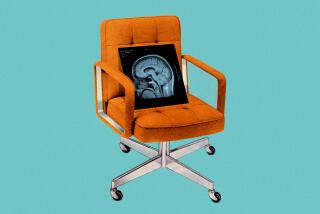A Real Brain Teaser
- Share via
What makes people smart?
It is a question that scientists and philosophers have pondered for centuries, prompting complex calibrations, from head measurements to brain-bending tests.
Yet the drive to probe the intellectual powers--and the limits--of the human mind has been thwarted by the hard facts: The brain was virtually a black box, its inner workings mostly a mystery.
Now, scientists are using the latest technology to peer inside, producing some of the first images of how gifted, and not-so-gifted, minds think.
What they see not only intrigues them, it sometimes surprises and stumps them as well. Why, for example, should male and female math wizards, matched in ability, seemingly use different brain mechanisms when solving problems?
Why, when certain mentally disabled people take intelligence tests, do they show more brain activity than people of average intelligence?
The questions about human brainpower don’t stop there. These days, the very idea of intelligence is up for reconsideration. Some researchers are calling for broader measures, and a broader view, of the mind’s potential.
Scholars long have haggled over whether smarts can be summed up as a single entity, as in an intelligence quotient, or a collection of interacting capabilities, or perhaps many distinct skills.
“We don’t want to be evaluating people on one thing which is turning out to be a very narrow and prejudicial concept of cognition,” said Harvard psychologist Howard Gardner, who goes so far as to argue that we have at least seven different “intelligences.”
*
“A lot is based on IQ and SATs (Scholastic Assessment Tests), and . . . we know the mind is much more complicated,” he said.
Proponents of a new concept called “emotional intelligence” don’t necessarily consider IQ the best predictor of how one will fare in life. What about empathy, intuition and social savvy? Certain emotional skills, they argue, seem to bring success--promotions and coveted invitations, for example.
They propose that emotion should not be considered separately from intellect. Often, feelings sharpen reason, says University of Iowa neuroscientist Dr. Antonio R. Damasio. Emotion helps reason to focus the mind, to set priorities.
UC Irvine professor Richard Haier, in a series of pioneering studies, has used positron emission tomography (PET) scanning to probe the neural underpinnings of intelligence, as traditionally assessed by IQ tests and the SATs.
Based on his continuing studies that began in 1988, Haier suggests that brighter people have lower brain metabolic rates because their brains are more efficient. Haier speculated that bright people might use fewer inessential, or even detrimental, circuits.
A follow-up study has bolstered his theory. Haier’s group compared the PET scans of mildly mentally disabled people to those of subjects of average intelligence. Sure enough, the mentally disabled individuals showed higher metabolic activity when doing the same mental tasks.
But the brain’s machinations, it seems, are more complex than Haier’s original hypothesis suggested. In a study published last year, his group found that when bright people are given harder tasks, tailored by computer to their abilities, their brains work harder than the average person’s. Apparently, brain activity depends to some extent on the difficulty of the task and level of effort required.
Haier was surprised again when he discovered that men’s and women’s minds functioned differently--even when they had the same mental abilities.
*
He and Iowa researcher Camilla P. Benbow compared PET scans of mathematically talented students--as determined by the SAT--to those of average students. He expected to find some measurable difference in brain activity between the gifted and the not-so-blessed.
Instead, his most striking finding was overall gender differences. Among the men doing math problems, a part of the temporal lobe consistently lit up; the more it lit up, the better they scored on the math test. Among women, however, no such pattern emerged. Average and gifted women showed no significant difference in temporal lobe activity.
What gives? Haier’s short answer is, “We don’t know.” But he suspects that men’s brains are more focused in their mathematical thinking than women’s. Conversely, the talented females simply may be more efficient than their average peers, rather than more focused.
All this research assumes that IQ and SAT scores say something important about a person’s intellectual potential. But Haier freely admits that these scores won’t indicate who can best work a crowd or who will have the most friends.
The question is, are these emotional skills a completely separate sort of smarts?
Haier thinks not. He believes emotional intelligence is correlated with IQ, and is one component of overall intelligence. IQ, he says, “is the strongest single predictor of general intelligence, with emotional intelligence a close second.”
University of New Hampshire psychologist Jack Mayer, one of two scholars to construct the theory of emotional intelligence, thinks that this may be an ability distinct from general intelligence. He got the idea in graduate school, where he watched artists and engineers struggle to communicate.
“Both were quite intelligent,” he said, “but some artists couldn’t understand logical thought and . . . some engineers couldn’t understand what all the buzz was about emotions.
“It began to dawn on me . . . that emotions convey important pieces of information. If we can say there is a spatial ability to get information from grids and diagrams, maybe there is an intelligence that allows people to get information from social interactions.”
If this intelligence exists, it is exceptionally hard to define, let alone quantify. It’s not a matter of asking someone to assemble a puzzle or to define a word.
*
“Getting a pure, ideal measure is somewhere in the future. There isn’t a lot of research on it yet,” said Mayer, who is working on these assessment tools.
Can these brain periscopes of the new technology be applied to “emotional intelligence?” Theoretically, experts say, they can, insofar as this intelligence can be measured and defined.
Take a simple case like facial expressions. University of Pennsylvania researcher Ruben Gur has shown that women are better than men at detecting sadness on the faces of female actors; brain imaging showed that men had to work harder to get the right answers on the test. This doesn’t mean women are emotionally sharper than men--but it is one way of assessing a particular emotional skill.
Some researchers, like Gardner, predict that neuro-imaging will show that each form of intelligence involves different parts of the brain.
Other scientists believe that technology will not yield such neat answers; it will, however, provide a glimpse of the mind’s complexity.
“People seem to like to attach [the word] intelligence to a lot of things,” said Douglas Detterman, editor of the journal Intelligence and Mayer’s former advisor. But “psychology has been too atomized in the sense that it divided intelligence, motor behavior and emotion into different areas. I think there is a lot of relationship between” them.






